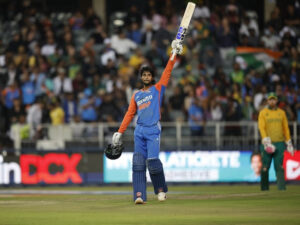
India’s First Batch Departs for Australia Without Kohli and Rohit: Strategic Move or Risky Gamble?
Mumbai was abuzz with activity as the first batch of India’s squad departed for Australia to gear up for the iconic Border-Gavaskar Trophy. Yet, what caught everyone’s attention wasn’t just the team’s travel—it was the glaring absence of India’s most prominent cricketing icons, Virat Kohli and Rohit Sharma. In a move that has both baffled and polarized fans and experts alike, the BCCI chose to send a select group of players ahead, leaving behind two of India’s most experienced and vital cricketers. This controversial decision raises some serious questions: Is this a strategic move to manage workload, or is India taking a significant risk that could backfire?
A Tactical Workload Management Decision?
Those defending the BCCI’s choice argue that sending a partial squad—one that notably excludes star players like Kohli and Sharma—is an intentional and calculated move. The series in Australia is set to be a grueling one, with intense competition in front of demanding crowds, harsh conditions, and tight schedules. By allowing seasoned players more time to rest, the BCCI might be aiming to keep their key performers fresh and injury-free. After all, Kohli and Rohit have had an exceptionally demanding calendar, with both recently starring in the World Cup and playing relentless ODI and T20 cricket throughout the year.
However, with modern cricket’s packed schedules, nearly all players experience high workloads. Some question whether this select approach to workload management is truly fair. Why do only Kohli and Sharma merit extra rest when others on the squad are equally valuable and fatigued? Critics argue that this “special treatment” perpetuates an unspoken hierarchy within the team, implying that some players are simply more dispensable than others.
Missing the Early Preparations: Advantage or Disadvantage?
One of the primary benefits of sending players early is acclimatization. The conditions in Australia are drastically different from those in India; the pitch, bounce, weather, and overall playing environment can be a significant challenge for any cricketer. By sending players ahead, the BCCI intends to give them time to get accustomed to Australia’s unique playing conditions. This advantage, however, is only half-utilized if Kohli and Rohit—the leaders in the dressing room—aren’t there to guide and strategize with the rest of the team.
Without these experienced players, younger and less experienced team members might be missing out on vital early preparation. Virat Kohli’s aggressive approach and Rohit Sharma’s patient, calculated gameplay are invaluable assets to the team’s preparations. They’re not only skilled players but also strategic thinkers, with immense insight into how to tackle the Australians on their home turf. Will the absence of these veterans disrupt the morale of the squad, or will younger players take the opportunity to step up?
Morale and Leadership Void: Can the Young Guns Handle It?
The absence of Kohli and Rohit goes beyond tactical concerns—it impacts morale and leadership. Both players have established themselves as pivotal figures in Indian cricket, inspiring not only fans but also their teammates. Kohli’s passion and intensity on the field ignite the entire team, and Rohit’s calm, calculative approach often tempers high-pressure moments. Their duality as leaders brings stability and a psychological edge, especially in hostile environments like Australia.
Now, this absence could force young players into leadership roles, which is a high-stakes gamble. Could this premature pressure build up over the tour, leading to potential breakdowns during critical moments? Some might say it’s too much to expect players like Shubman Gill, Ruturaj Gaikwad, or Shardul Thakur to lead with the maturity Kohli and Sharma bring. While allowing the next generation to step up might be an admirable goal, doing so at the expense of seasoned leadership on a major overseas tour seems risky, especially considering the stakes of the Border-Gavaskar Trophy.
Mixed Reactions Among Fans and Experts
The cricketing world has been quick to voice mixed opinions. While some see this as a forward-thinking move by the BCCI, others believe it shows a lack of foresight. Social media has been awash with debates, with many fans pointing out that this unconventional move hints at potential disunity or favoritism within the team. Others argue that India’s cricketing board is taking Australian conditions too lightly and sending a message that this series might not be a priority compared to domestic tournaments or the IPL, where star players’ attendance is rarely questioned.
From the commentary box to the fan forums, everyone is weighing in. Former Indian cricketers have expressed concerns, with some warning that this half-baked strategy could work to Australia’s advantage. “Leaving your best players behind while the team acclimatizes to foreign conditions could lead to issues when they eventually join,” one former player noted, emphasizing the importance of solidarity in overseas tours.
High-Risk, High-Reward—Will This Experiment Pay Off?
The BCCI’s decision to stagger its squad deployment, keeping Kohli and Rohit out of early preparations, is undoubtedly bold. In some ways, it embodies the new, fearless approach Indian cricket is known for. Yet, it also risks unsettling team chemistry and putting undue pressure on younger players. With the Border-Gavaskar Trophy just around the corner, only time will tell if this was a brilliant strategy to maximize performance or a gamble that could cost India dearly.
As the team heads to Australia without its most iconic players, India’s cricket community and fans are left with mixed emotions: excitement, anticipation, and perhaps a tinge of apprehension. While we all hope this experiment pays off, there’s no denying that the stakes have just been raised.






